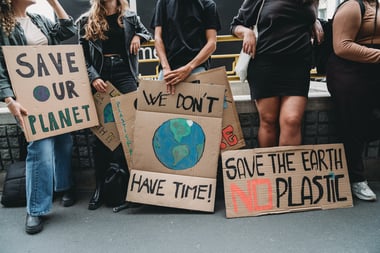Authorities around the world are introducing legislation and penalties to combat the threat of greenwashing incidents. Most recently, the European Union kicked off 2024 by adopting a new law — the Greenwashing Directive — to stop greenwashing practices.
You can read the latest on the Green Claims Directive here.
This means businesses that greenwash, or breach sustainability laws, risk being slapped with fines worth millions. Ouch!
We looked into some of the most significant greenwashing penalties and settlements seen to date to help navigate these new regulations — here's what we found.
What’s on this page?
01 | Summary: The nine biggest greenwashing fines
02 | Are more companies getting called out for greenwashing?
03 | How can companies avoid greenwashing?
04 | Summary
05 | FAQs
Greenwashing examples: The nine biggest fines (so far)
|
Company |
Fine |
Reason for fine |
|
Volkswagen |
$34.69 billion |
Implementing software that falsified data and helped evade emissions tests on its vehicles |
|
Toyota |
$180 million |
Delayed sharing of emissions-related reports |
|
DWS |
$25 million |
Potentially marketing ESG funds as ‘greener’ than they actually were |
|
Eni |
$5.6 million |
Claiming its palm oil diesel was ‘green’ |
|
Kohl’s & Walmart |
$5.5 million (total) |
Both claimed their products were made from environmentally friendly bamboo when they were made from other materials |
|
Goldman Sachs |
$4 million |
Failing to follow ESG investment policies and misleading its customers |
|
Keurig |
$2.2 million |
Making misleading claims about its single-use coffee pods, suggesting they were recyclable when recyclers don’t widely accept them |
|
BNY Mellon |
$1.5 million |
Failures to implement ESG policies and overstating the ESG value of its funds |
|
H&M & Decathlon |
$430.5k & $530k |
Making unsubstantiated claims on their labels |
NOTE: We've converted each value to US dollars to stay consistent throughout this article.
1. Volkswagen
Amount fined: $34.69 billion
Fined by: Multiple establishments
Year: 2017-2020
One of the most high-profile greenwashing penalties ever recorded was handed to Volkswagen. The carmaker faced a slew of fines and legal fees worldwide after it deceived regulators and consumers over the emissions of its vehicles.
Although the company has tried to turn its environmental image around since then, the fallout of the so-called ‘dieselgate’ is ongoing.
The accusation
In 2015, the US Environmental Protection Agency (EPA) accused Volkswagen of violating the Clean Air Act after discovering the company used software in its cars that recorded lower greenhouse gas emissions.
The data collected by the software was shared internally and with external regulators. It could be found in half a million US cars and a further 10.5 million others worldwide.
In reality, the vehicles reportedly produced 40 times the amount of nitrogen oxide pollution permitted by US law.
Authorities recalled hundreds of thousands of cars worldwide, and Volkswagen faced multiple fines in various countries. This included a $2.8 billion criminal fine in 2017, imposed by a US federal judge, and a $125 million penalty in Australia in 2019. In 2020, Volkswagen revealed that Dieselgate had cost the company €31.3 billion ($34.69 billion).
The company response
Despite appealing some of the fines it faced, Volkswagen also vowed to reform its corporate culture and compliance structures to ensure something like this never happens again.
“Our company was dishonest with the EPA, and the California Air Resources Board, and with all of you.” – Volkswagen America CEO Michael Horn, in 2020.
2. Toyota
Amount fined: $180 million
Fined by: The US Justice Department
Year: 2021
In 2021, Toyota was ordered to pay $180 million for violating the US Clean Air Act over its emissions reporting. It's worth noting that this is the largest penalty ever given to a company for violating the EPA’s emission-reporting requirements
The accusation
Between 2005 and 2015, Toyota — the world’s second-largest carmaker — failed to report defects in its vehicle tailpipe emissions and also failed to inform the EPA about progress on recalls related to emissions defects.
When it comes to emissions reporting, companies are expected to share reports that highlight their regulatory compliance. However, in Toyota’s case, the organization delayed sharing 78 reports, some filed 8 years later than expected.
They also failed to share over 200 quarterly updates on emissions recalls. Delays in reporting allowed Toyota to ultimately profit from selling more vehicles without being truthful about emissions challenges and failures.
The company response
A spokesperson for Toyota said they alerted the authorities when they discovered the defect. However, they added that "some of our reporting protocols fell short of our high standards, and we are pleased to have resolved this matter.”
Like Volkswagen, Toyota's fallout continued long after the initial case. A 2023 report claimed Toyota could be facing a fine of $50 million in Australia for overstating its emissions.
3. DWS
Amount fined: $25 million
Fined by: The US Securities and Exchange Commission
Year: 2023
Environment, social, and governance (ESG) law has grown massively in importance for businesses over the last few years — ironically, this has also contributed to a rise in greenwashing.
In 2023, the Deutsche Bank-backed investment firm DWS agreed to a $25 million settlement over ESG misstatement allegations. DWS vowed to continue developing itself as an ESG leader following the fine.
The accusation
According to investigators at the US Securities and Exchange Commission (SEC), DWS claimed itself as an ESG investment leader from 2018 to 2021 — but didn’t implement ESG policies promised to its investors.
In one example, a DWS senior leader had written a marketing piece that claimed ESG was ‘top of mind throughout our organization’, claiming that every DWS investment team uses the ‘DWS ESG Engine’ to make investment decisions. It turns out that may not have been necessarily accurate.
A former employee also alleged that DWS made misstatements about the size of its ESG assets.
As a result, an SEC statement claimed DWS: “made materially misleading statements about its controls for incorporating ESG factors into research and investment recommendations for ESG integrated products, including certain actively managed mutual funds and separately managed accounts.”
The company response
According to Reuters, DWS didn’t admit or deny the claims, but the settlement suggests DWS was keen to move past the investigation they faced.
The firm also released a statement in response to the former employee's claim:
“DWS wants to address unfounded allegations being reported in the media on its ESG disclosures: DWS stands by its annual report disclosures. We firmly reject the allegations being made by a former employee. DWS will continue to remain a steadfast proponent of ESG investing as part of its fiduciary role on behalf of its clients.”
4. Eni
Amount fined: $5.6 million
Fined by: The Italian Competition and Market Authority
Year: 2020
Signaling an increased clampdown on greenwashing claims, Italian regulators fined Eni €5 million ($5.6 million) after the oil company advertised its Eni Diesel+ fuel on TV and in newspapers as ‘green.’
The accusation
In a historic move, investigators ruled that Eni’s marketing campaign was deceptive as it suggested its biofuel diesel had a positive environmental impact.
Eni used 15% hydrotreated palm oil and 85% fossil fuels to make Eni Diesel+. According to Rainforest Rescue, large swathes of forest in Southeast Asia were being cut down to make way for palm oil plantations like the ones Eni relied on.
More alarmingly, biodiesel produced from palm oil reportedly releases three times as many emissions as fossil fuel diesel.
The company response
Eni stopped running the ads for its biodeisel, but reports suggest the company has ramped up biofuel projects in recent years. What’s more, its greenwashing turmoil didn’t end there.
In 2023, Greenpeace Italy was among the NGOs that launched a new lawsuit against Eni, claiming they knew early about the extent of the climate crisis.
Greenpeace claims ‘Eni knew’ about the climate crisis, based on a report they released in the 1970s that acknowledged “pollution has increased in tandem with the expansion of production, causing increasing damage to human health and the environment on which, ultimately, human life itself depends.”
In another report from the 1980s, an Eni representative wrote: “It is incumbent on us to work as of now, as far as possible, to contain the phenomenon of carbon dioxide emissions.” The claim suggests Eni continued to promote natural gas despite knowing the environmental risks, and without informing the public of their findings.
Eni then reportedly put plans in place to sue all the NGOs back, with a spokesperson saying:
“We strongly believe, not only that this does not constitute greenwashing, but rather it is a serious way to face the energy trilemma: energy security, competitiveness, and decarbonization.”
5. Kohl’s and Walmart
Amount fined: $5.5 million
Fined by: The US Federal Trade Commission (FTC)
Year: 2022
In 2022, US retailers Kohl’s and Walmart agreed to pay a $5.5 million collective settlement over suggestions that they’d used vague and misleading claims when marketing products as bamboo, when actually they were made from other materials.
The allegations
Complaints against the retailers alleged that, since 2015, they had violated the Textile Act for marketing products, such as sheets and bath rugs, as made from bamboo.
The retailers falsely marketed these products, claiming in some wording that they were "bamboo-derived" textiles made by eco-friendly processes when they weren’t. They also used language like “sustainable” and “highly renewable” in their marketing, implying that the companies cared about the planet through their products.
While bamboo is seen as a sustainable material, the products were made from rayon, a semi-synthetic material with a negative environmental impact.
The company response
In 2022, a Kohl’s spokesperson said: “We have reached a settlement with the Federal Trade Commission (FTC) and continue to take these regulations seriously.”
A spokesperson for Walmart also said: “We are committed to being the most trusted retailer and take these claims seriously. We hold ourselves accountable when issues like this are raised.”
6. Goldman Sachs
Amount fined: $4 million
Fined by: The US Securities and Exchange Commission
Year: 2022
Another financial firm that's come under fire for ESG failings is the American investment bank Goldman Sachs. In 2022, Goldman Sachs Asset Management agreed to pay $4 million to settle allegations of ESG violations.
The allegations
Prior to 2020, Goldman Sachs staff were expected to complete ESG questionnaires that helped them determine which companies were included in their funds. This would ultimately be presented to investors as part of an ESG package.
However, it turns out Goldman Sachs wasn’t entirely clear about how they were evaluating ESG factors, which amounts to misleading ESG statements.
From 2017 to 2020, the US Securities and Exchange Commission (SEC) concluded that Goldman Sachs misled its customers about ESG investments. SEC claimed staff failed to implement written policies and procedures regarding ESG factors, meaning there wasn’t much information available about their ESG assessment processes.
The company response
By paying the penalty, Goldman Sachs also agreed to a cease-and-desist order, yet didn’t actually admit to the SEC allegations.
Goldman Sachs released a statement that said it was “pleased to have resolved the matter,” adding:
“Goldman Sachs Asset Management is committed to its pursuit of best practices across its portfolios for sustainable, long-term value creation that helps its clients meet their investing needs.”
7. Keurig
Amount fined: $2.2 million
Fined by: The Canadian Competition Bureau
Year: 2022
In 2022, Canadian regulators ordered Keurig to pay $2.2 million (CA$3 million) after making misleading claims to customers about its single-use coffee pods. This is a bit of a unique greenwashing case in this list, as it's the only one that looks at an item's recyclability.
Moreover, the coffee pods were actually recyclable in some locations, leading some to suggest that the greenwashing claims are a little more nuanced in this case.
The allegations
Keurig started making ‘recyclable’ coffee pods in 2016, but it turns out that most waste management organizations don’t accept the K-Cup pods.
The greenwashing case, brought forward in Canada, found that municipal recycling programs outside the major provinces of British Columbia and Quebec didn’t usually accept coffee pods for recycling because they’re often dirty.
On top of that, Keurig Canada wasn’t clear about the steps needed to recycle their pods, suggesting customers could just peel off the lids and empty the coffee grounds when sometimes recyclers required more steps.
The company response
As part of the settlement, Keurig agreed to donate $593,000 (CA$800,000) to a Canadian charity committed to environmental efforts, as well as paying the $2.2 million (CA $3 million) fine.
A larger payout followed in the US after being ordered to pay the Canadian fine. In 2023, Keurig settled a $10 million class action suit in the US, where plaintiffs claimed the company misled its consumers.
According to ABC News, Keurig stood by its original wording, "clearly communicating how to recycle our K-Cup pods where accepted is a responsibility that we take seriously."
Their packaging was later updated to reflect recycling nuances, saying the pods are "not recycled in all communities."
8. BNY Mellon
Amount fined: $1.5 million
Fined by: The US Securities and Exchange Commission
Year: 2022
In 2022, the Bank of New York Mellon came under fire after claiming a number of investments had received an ESG quality review. Like other financial organizations on this list, BNY Mellon was fined for making ESG misstatements.
The allegations
Between 2018 and 2021, BNY Mellon was said to have overstated the ESG values of some of its investments, ultimately misleading its clients.
An SEC investigation found that “BNY Mellon Investment Adviser did not always perform the ESG quality review that it disclosed using as part of its investment selection process for certain mutual funds it advised.”
This is important as it came at a time when a growing number of investors were paying attention to ESG funds.
The company response
BNY Mellon didn’t admit or deny the SEC investigation’s conclusion and agreed to pay the penalty they faced.
A BNY Mellon representative also said they were “pleased to resolve this matter concerning certain statements it made about the ESG review process for six U.S. mutual funds. While none of these funds were part of the BNYMIA ‘Sustainable’ fund range, we take our regulatory and compliance responsibilities seriously and have updated our materials as part of our commitment to ensuring our communications to investors are precise and complete.”
9. H&M and Decathlon
Amount paid: $430,500 and $530,000
Investigated by: The Netherlands Authority for Consumers and Markets (ACM)
Year: 2022
The fashion industry has faced a lot of challenges when it comes to sustainability. While some brands have emerged as environmental leaders, others have come under fire in recent years.
While not necessarily a fine, H&M and Decathlon donated €400,000 and €500,000 to sustainable causes in 2022 as compensation for making unclear sustainability claims.
The allegations
The Netherlands Authority for Consumers and Markets (ACM) found that clothing retailers H&M and Decathlon used terms such as ‘conscious choice’ and ‘ecodesign’ on their labels without sharing details to back up the environmental claims.
While the companies weren’t fined for their behavior, the investigation suggests that greenwashing may have occurred.
The company response
H&M and Decathlon reportedly removed sustainable labeling from their stores and websites following the investigation to avoid being fined.
They also promised to make donations to sustainability initiatives linked to the fashion industry. However, it’s unclear which initiatives actually benefited from these donations.
A spokesperson for H&M also said the company’s labeling “could have been clearer and more comprehensive.”
Since the payout, H&M has faced further legal troubles over its sustainability claims, with a plaintiff in New York filing a lawsuit against H&M in July 2023 over misleading sustainability labels.
Are more companies getting called out for greenwashing?
In 2023, more than half of consumers encountered misleading sustainability claims by brands. The thing is — people have simply had enough.
The rise of the conscious consumer means that people are no longer willing to overlook corporate behaviour that negatively impacts the planet. They’re leveraging their purchasing power to support brands that make a difference.
But what does this mean for greenwashing? Well, it’s getting much easier to spot the signs of greenwashing, and consumers aren’t afraid to call brands out on it.
The introduction of greenwashing legislation makes it even easier to identify when these practices happen. This includes the EU’s new greenwashing legislation, which will ban misleading environmental claims and hold companies to account more for their labelling. However, this new legislation won’t be coming into place until early 2026.
Anti-greenwashing regulation is also gathering pace in other parts of the world. The Federal Trade Commission’s Green Guides outline how companies should make environmental claims in the US.
What’s more, a new rule coming in May 2024 will prevent all UK financial firms from making misleading claims. The UK-based Green Claims Code also offers guidance for businesses making environmental claims.
In light of this, there’s more opportunity for greenwashing to be reported and a higher chance that authorities will investigate large companies.
How can companies avoid greenwashing?
Companies have to take greenwashing seriously to maintain customer loyalty and adhere to mounting regulations.
Simple steps like avoiding misleading language on packaging and backing up any environmental claims with hard statistics can go a long way. You can also partner with other organizations to help you track environmental data and ensure accurate reporting. This will become even more important as more ESG reporting standards come into play.
Check out our complete guide on how to avoid greenwashing for more information.
Summary
Greenwashing can have significant financial implications for businesses worldwide. Some organizations on this list may not feel the impact of a few million dollars, but being outed for greenwashing can also impact a brand’s reputation.
While it might not always be the company’s intention, the fact that greenwashing is on the rise shouldn’t go unnoticed. Fines are, unfortunately, necessary as they serve as a deterrent to organizations that put profit over the planet.
What’s more, there are plenty of examples of companies guilty of greenwashing that never ended up being fined. New legislation introduced in 2024 suggests that things are changing, and brands more and more be held more accountable for their claims.
We know many brands genuinely care about the environment and don’t need to be reminded about greenwashing. But, by knowing the greenwashing risks and what’s at stake, businesses can take the lead in communicating truth about their green claims and statements.
FAQs
What is a famous example of greenwashing?
One of the most famous examples of greenwashing comes from Volkswagen after the company was accused of cheating on pollution tests and modifying engine software. It’s sometimes called ‘Dieselgate’ and has cost VW somewhere in the range of 31 billion euros — so far.
What are the fines for greenwashing
Greenwashing fines can cost a business millions of dollars. Because greenwashing regulation tends to differ from place to place, fines vary massively depending on where you are. Investigations into greenwashing can take years before any penalties are imposed.
Why was IKEA accused of greenwashing?
IKEA has come under the spotlight multiple times, including in 2021, when reports claimed the brand may have sold furniture linked to illegal logging. In another case, critics aimed at IKEA for building its “greenest store” in Greenwich despite tearing down another green building to make way for it.


-3.png)





.webp?width=380&name=Beach-litter%20(1).webp)
.webp?width=380&name=Refill%20product%20(1).webp)

.webp?width=380&name=ESG-laptop%20(1).webp)

